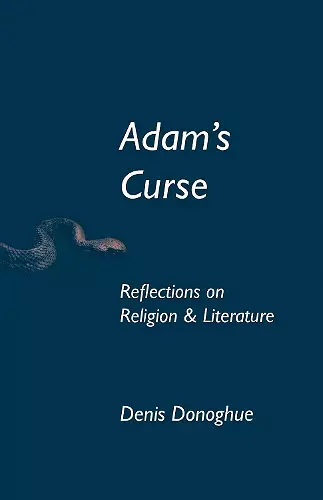Adam's Curse
Reflections on Religion and Literature
Format:Hardback
Publisher:University of Notre Dame Press
Published:23rd Apr '01
Currently unavailable, and unfortunately no date known when it will be back

Taking its title from a poem of William Butler Yeats, this collection of essays focuses on "Adam’s Curse"—the burdens and harsh conditions that, as Denis Donoghue underscores throughout, make any human achievement difficult. As he says, those "conditions include at various levels of reference the Fall of Man, categorical failure, loss, the limitations inscribed so insistently in human life that they seem to be in the nature of things, like death and weather." But hope is never ruled out, as Donoghue reminds us of "the possibility of putting up with the conditions and turning them to some account."
It is the "putting up with the conditions and turning them to some account"—a post-lapsarian struggle fraught with religious questions—that most interests Donoghue. These essays, which are explorations of both faith and literary works that engage faith, address a dazzling range of texts and writers: Yeats, Milton, Larkin, Heaney, Emmanuel Levinas, Alasdair MacIntyre, John Crowe Ransom, Henry Adams, William Lynch’s Christ and Apollo, and Robert Bellah’s Beyond Belief, among others. Common to all is an alertness to the social bearing of literature and the role it plays in relation to politics, religion, and especially ethics. What emerges, for Donoghue, is the need to restore the primacy of theology and church doctrine without evading the "dark parts" of the Old and New Testaments.
Through his probing, reflective encounters with philosophical and religious issues, we witness a magisterial intelligence at work.
“Donoghue delivered these eight pieces as lectures in March and April 2000 and doesn’t claim they are comprehensive or ‘even consecutive’ on their subject. Instead of a systematic philosophical treatise, they are a series loosely woven around a title borrowed from Yeats and directed by a ‘governing prejudice’ attributed to Coleridge—that ‘a fall of some sort or other ... is the fundamental postulate of the moral history of man.’ Donoghue sees himself going against the grain, reflecting on those two vagabonds, religion and literature, in the none-too-easy works of Emmanuel Levinas, Wallace Stevens, Robert Bellah, Alasdair McIntyre, Czeslaw Milosz, Seamus Heaney, and Charles Baudelaire. His is an appropriate stance for a critic, though in the end its tone is as defensive as it is critical. He richly explores an impressive range of writings as he defends the transcendence of analogy as opposed to the immanence of metaphor. Agreeing with him isn’t necessary to benefit from traveling with him through the literary landscape he surveys.” —Booklist, March 2001
"...this book by such a learned author who ranges magisterially over the whole panorama of Western philosophy, theology and literature, will provide ample food for thought. This... is no small achievement." —Zeitschrift fur Anglistik und Amerikanistik
“Topics include the poet John Crowe Ransom’s God of Thunder, a critique of Western churches for abandoning the God of the Old Testament in favor of Jesus.” —The Chronicle of Higher Education
“[C]hapters are provocative, citing a wide range of ethicists, poets, novelists, critics....” —Choice
“Adam’s Curse is Donoghue’s defence of an institutional theistic imagination in an age of callow unbelief. . . . Eliot is the devilish God that contemporary poets find the hardest to forgive. Donoghue has written the apologia he needs. He deserves our gratitude for it.” —London Review of Books
“Adam’s Curse: Reflections on Religion and Literature by Denis Donoghue is as eloquent and learned as anyone would expect who has ever heard Professor Donoghue lecture. If you read each sentence in this dense but sparkling book attentively, you will be charmed and stimulated....” —Times Literary Supplement
“This book will challenge the most sophisticated reader...but the rewards are likely to be many. Denis Donoghue’s learning is broad and deep, and walking this journey in his company can only enrich us.” —Christianity and Literature
“With a contemporary Catholic sensibility, Prof. Donoghue reflects on writers who confront religion and who to different degrees resist their secular Zeitgeist. [H]is criticisms are important and fair.” —Virginia Quarterly Review
“[S]cholars will appreciate the strenuous lucidity of Donoghue’s mind and prose and the power of the poetry he cites and studies.” —Religious Studies Review
“From its homeland in literature, this is a work of considerable theological insight and importance, carrying discussions forward where the professionals are frequently too myopic and wrapped up in their own debates to be able to disentangle the wood from the trees. This is a deeply religious book and one which theologians will find hard going and perhaps even frustrating. This is all the more reason why they should read it, and drink again from the well springs of the imagination from whence their task emerges. Donoghue’s work is a sturdy and intelligent reminder that we must remain open to varieties of discourse if we are to remain serious participants in the most profound questions which underlie our culture and condition.” —Modern Theology
“The book generously stimulates debate. Lucid prose, restrained animus, and well-tempered argumentation support its insightful analysis. Even critics of its conclusions will agree that Adam’s Curse is a blessing.” —Theological Studies
“Those familiar with the vast corpus of literature cited will find the book a marvelous treat, a veritable symphony of argument.” —Magill’s Literary Annual
“...as authentic a work of religion and literature as the field can offer.” —The Journal of Religion
ISBN: 9780268020095
Dimensions: 216mm x 140mm x 10mm
Weight: 227g
190 pages